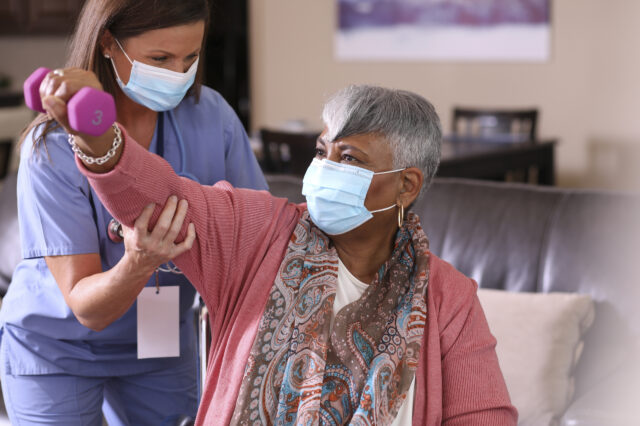How physical therapy can help breast cancer survivors
Oncology and lymphedema therapists at UF Health Jacksonville have specialty training to assess and treat conditions related to breast cancer treatment.

Update your location to show providers, locations, and services closest to you.
One form of lymphedema is a rare, inherited condition that compromises the body’s lymph system. The second and more common type occurs as a side effect of cancer treatments.
The use of radiation therapy or surgery to remove lymph nodes, though important to your recovery plan, can interfere with the normal drainage of your lymph system. The result is a buildup of lymph fluid in the tissues — usually in the arms or legs — that can cause swelling and discomfort. You are also at greater risk for infection in the affected area.
If your surgery and radiation therapy are planned as part of your cancer treatment, we can help you establish a surveillance and monitoring plan to closely follow your progress.
Early detection may reduce your risk of developing lymphedema. With new technologies, we can establish a monitoring plan that will help detect signs of fluid buildup. Specialists at UF Health Oncology in Jacksonville use SOZO bioimpedance spectroscopy, a noninvasive technology to measure and track fluid buildup in at-risk limbs.
To learn more about lymphedema prevention monitoring, schedule an appointment with UF Health Rehabilitation.
At UF Health Rehabilitation, our certified lymphedema therapists are an important part of your care team — before, during and after your cancer treatment.
In addition to helping you establish a prevention surveillance and monitoring plan, our specialists will tailor rehabilitation therapies if lymphedema is detected. They will focus on decreasing pain and swelling, improving your ability to move freely and helping you get back to the activities you enjoy.
Here are some options our rehabilitation specialists can discuss with you:
Oncology and lymphedema therapists at UF Health Jacksonville have specialty training to assess and treat conditions related to breast cancer treatment.
